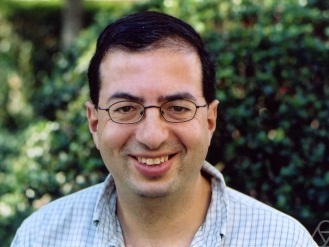
Yuval Peres
Yuval has published more than 200 papers with 100 co-authors and has mentored 19 PhD theses. His research encompasses many areas of probability theory, including random walks, Brownian motion, percolation, point processes and random graphs as well as connections with Ergodic Theory, PDEs, Combinatorics, Fractals, and Theoretical Computer Science. He has recently co-authored books on Markov chains and mixing times, on zeros of Gaussian analytic functions, and on Brownian motion. Yuval is a fellow of the AMS and a recipient of the Rollo Davidson Prize. In 2001 he received the Loeve Prize, awarded once every two years to a leading probabilist. Yuval was an invited speaker at the International Congress of Mathematics (2002) and in the European Congress of Mathematics (2008). His favorite quote is from his son Alon, who was overheard at age 6 asking a friend: "Leo, do you have a religion? You know, a religion, like Christian, or Jewish, or Mathematics....?"